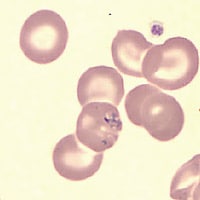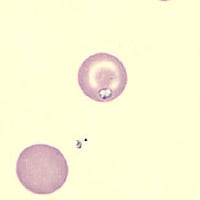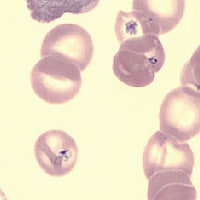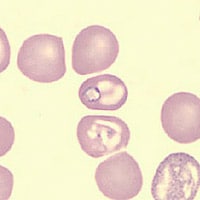
Monthy Case Studies - 2003
Case #113 - August, 2003
A 39-year-old male Liberian native, currently living in Rhode Island, has sickle cell thalassemia. His condition made it necessary for him to receive multiple blood transfusions. He began feeling ill early in the month and was admitted to the hospital several weeks later. Figures A-D are images taken from his blood smears. What is your diagnosis? Based on what criteria?

Figure A

Figure B

Figure C

Figure D
Acknowledgement: This case was kindly provided by the Rhode Island Department of Health Laboratory.
Answer to Case #113
This was a case of babesiosis caused by Babesia microti. Diagnostic features observed included:
- the presence of pleomorphic intra-erythrocytic organisms, consistent with Babesia sp.
- vacuolated ring-form parasites, also consistent with Babesia sp.
- the absence of pigment in the parasites infecting the red blood cells.
The patient's serum was also tested for Babesia microti-specific antibodies in the indirect fluorescent antibody (IFA) test and was positive at 1:4096, indicating infection with B. microti. Because the patient had received multiple blood transfusions and had no risk factors for acquiring B. microti via tick transmission, this was assumed to be a case of transfusion-related babesiosis. An investigation of the blood donors was begun to 1) identify the infected donor to ensure that any of his remaining blood products were removed from the blood supply, and 2) identify other patients who received blood products from the infected donor and evaluate them for infection.
More on: Babesiosis
Images presented in the monthly case studies are from specimens submitted for diagnosis or archiving. On rare occasions, clinical histories given may be partly fictitious.
 ShareCompartir
ShareCompartir


